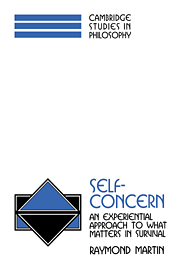1 - Questions
Published online by Cambridge University Press: 26 March 2010
Summary
In our own times the use of hypothetical examples in connection with the debate over personal identity and related issues has become controversial. In particular, some have argued that because these examples are of (possibly) impossible situations, the consideration of them cannot shed light on what matters in survival. Since in the present study I intend to make use of hypothetical examples of (possibly) impossible situations, I want now to defend the uses to which I shall put them. To do that, I first specify a fission example that is a modified version of one originally presented by Shoemaker (1984, p. 119). Then I use this example to explain why fission examples, in particular, and hypothetical examples of (possibly) impossible situations, in general, are not only a legitimate but perhaps an indispensable tool in revealing what matters to people in survival.
Imagine, then, that you have a health problem that will result soon in your sudden and painless death unless you receive one or the other of two available treatments. The first is to have your brain removed and placed into the empty cranium of a body that, except for being brainless, is qualitatively identical to your own. The second is to have your brain removed, divided into functionally identical halves (each capable of sustaining your full psychology), and then to have each of these halves put into the empty cranium of a body of its own, again one that is brainless but otherwise qualitatively identical to your own.
- Type
- Chapter
- Information
- Self-ConcernAn Experiential Approach to What Matters in Survival, pp. 10 - 30Publisher: Cambridge University PressPrint publication year: 1997



